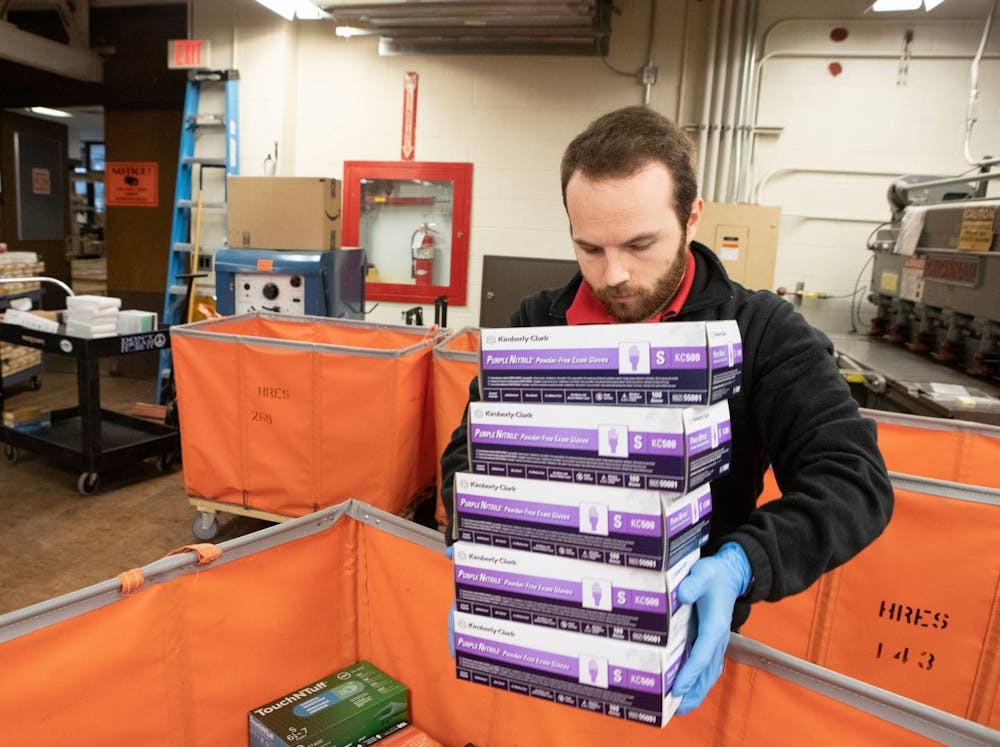As laboratories all across campus have halted research and shuttered their doors, members of the University community answered the call of service. Many individuals, ranging from administrators within the University’s Emergency Management Group to professors in the School of Architecture to costume designers in McCarter Theatre, have responded to Governor Phil Murphy’s call for universities, corporations, and other organizations to donate personal protective equipment (PPE).
As of April 10, the Office of Environmental Health and Safety had donated 64,677 pieces of PPE to the New Jersey Office of Emergency Management, as well as the respective emergency management offices in the Municipality of Princeton and West Windsor Township.
John T. Groves, Hugh Stott Taylor Chair of Chemistry and professor in the Department of Chemistry, said the Emergency Management group worked in conjunction with the Office of the Dean for Research to provide “helpful” guidance for principal investigators and researchers across campus.
Prior to the suspension of all non-essential research on campus, each lab was asked to fill out an online form to declare the types of PPE in their possession, including the location and total count. Emergency Management then coordinated with Facilities to collect N95 respirator masks, gloves, gowns, and protective eyewear that were not otherwise needed for the operation of campus laboratories.
The Groves Lab donated a couple dozen boxes of protective gloves and a handful of aprons and masks. That being said, most of the personal equipment from the Department of Chemistry came not from individual labs, but from its stockrooms.
“We typically do not keep a large inventory of PPE items in the lab because they are readily available in our stockroom or can be ordered in quickly from local vendors,” Groves explained, adding that there “may have been about 200 or so boxes of gloves in all of Frick.”

In addition, the Department of Public Safety has donated boxes of PPE items such as gloves to the Princeton Police Department.
“During these times when protective equipment is desperately needed, it is great to know that our trusted partner has our back in making sure that we have the supplies we need to serve our community,” the Princeton Police Department wrote in an online post.
Total donations to the municipal and state offices of Emergency Management over the last three weeks comprised 3,000 surgical gowns, 14,560 N95 respirators, 5,250 surgical masks, 28,200 nitrile gloves, 4,200 vinyl gloves, 1,600 cone masks, 300 Tyvek Hoods, 292 Tyvek coveralls, 5,975 shoe covers, and 1,300 hair nets.
Still, the University said that it has retained enough PPE and other materials for staff members at University Health Services, Public Safety, Facilities, University Services, and Environmental Health and Safety who need to interact either directly or indirectly with students who are in isolation or quarantine.

The University has also collaborated with the American Red Cross to host community blood drives at the Carl A. Fields Center for Equality and Cultural Understanding. The first drives will take place from 9 a.m. to 3 p.m. on April 16 and 17, with additional dates to be scheduled in May and July.
In addition, the University donated $25,000 to Send Hunger Packing Princeton to support the nonprofit’s work in the Princeton Public Schools. The contribution will help provide weekend meals at home for the 500 students who participate in the free/reduced price lunch program.
Campus Dining has also donated perishable and nonperishable food items including liquid eggs, basmati rice, and granola to the Trenton Area Soup Kitchen.
“Princeton is a very cohesive community,” Groves wrote in an email statement to The Daily Princetonian. “It has been reassuring to see how well the various units have shared information and have pulled together in a very short time to mount an effective response.”
Amidst critical shortages in protective gear reported by hospitals and frontline workers across the country, the University community — from members of the Department of Mechanical and Aerospace Engineering to the School of Architecture — has stepped up to produce essential equipment for medical personnel.
The Black Box Research Group, led by V. Mitch McEwen, assistant professor of architecture, is spearheading an initiative to 3D print face shields.
An “open source action-oriented research agenda” aimed at re-appropriating the architecture lab to print face shields was recently approved by the Office of the Dean for Research as an exception to the campus-wide shutdown of laboratory operations.
The project lists prototyping adjustable single-use harnesses as one of its “rapid research goals.” Such a design would function as a tight-fitting harness for an “ad hoc fabric mask” that would be able to be produced more rapidly than standard fabric masks.
In a March 23 tweet, McEwen declared the Prusa face shield — based on an open-source face shield design created by a Czech 3D printing company — as the “best thing to print right now.” Even so, McEwen is hoping a revised design will reduce the print time for the visor and is looking into transitioning from laser cutting to relying on a computer numerical controlled blade made by Zünd Systemtechnik AG, a Swiss company specializing in digital cutting systems.
As of April 9, the Black Box Research Group is currently producing two face shield models: an MCQN-designed shield made of polycarbonate or polyethylene terephthalate glycol, as well as a visor designed by a team at the Cornell University School of Architecture, Art, and Planning.
At McCarter Theatre Center, even as all live performances have been suspended through early-summer, all five members of the Costume Shop and several members of the Prop Shop have thrown their support behind helping produce reusable face masks, which are critical for front-line workers.
Sarah Romagnoli, First Hand in the Costume Shop, says her involvement with the Mercer Mask Project — a collective of volunteers creating handmade masks for members of the community — was inspired by her sister, a physician working for the military in Kentucky.
Based on conversations with her sister, Romagnoli sought to design extra large, washable masks that can fit over N95 respirator masks. This could not have come at a more crucial time, as healthcare professionals report having to use the same masks for five times longer than normal.
Romagnoli said she invoked her experience as a former fashion designer to create masks that are able to fit a variety of profiles and sizes of faces.
Experimenting with fabrics such as silk — which she had lying around readily in her studio from her wedding gown designer days — and cotton, Romagnoli ultimately settled on 450-thread-count sheets.
In her home studio, she cuts fabric in mass quantities using a rotary cutter.
“I'm not really sure how many I make a day,” she said. “Some days, I make more ... probably two dozen. In the first week of mask making, I made quite a few of several designs and sizes.”
In response to requests from doctors and nurses, Romagnoli is working to incorporate Halyard H600 Sterilization Wrap in her design, a nonwoven fabric originally designed for use in sterile processing of medical equipment.
“I've been trying to contact hospitals and other sources of that material so that I can ramp up manufacturing with the right material, in a style which is most useful,” Romagnoli explained, adding that she has already given two doctors several designs with the sterilization wrap to test out and give her feedback on.

Donated masks from McCarter Theatre Center's Costume Shop.
Photo courtesy of McCarter Theatre Center
Romagnoli said she and her team have received full support from McCarter Theatre’s Managing Director, Artistic Director, and Production Manager.
“Not only have they praised our efforts in full staff meetings, but [they] have given us materials such as tightly woven fabric, elastic and bias tape to use,” she said.
Masks made by the McCarter Theatre team have been donated to nurses in Kentucky, Pennsylvania, and New Jersey, as well as medics in southern New Jersey.
“I’m grateful to be doing something to keep the virus from spreading faster or at all. It’s times like this when I wish I was more active on social media so that I could have organized a bigger, faster response,” she said. “I’m reminded of how small the world can be if a virus can travel to every country and affect our behavior and elicit similar human responses.”








